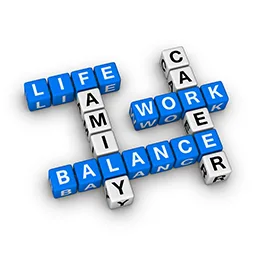Taking Care of Yourself

By Ibby Smith Stofer
A healthy life balance is hard to achieve. Because of this, time for ourselves often seems non-existent.
In today’s society, individuals are frequently so busy that personal time exists only as a fleeting wish. Minds race from task to task with no thought of time for oneself: “I have to coach my son’s soccer game after work,” or, “I have to do the laundry once I get the baby down,” and, “I need to check my email and get back to so-and-so.” Do these thoughts sound familiar? When was the last time you cleared your mind and didn’t think about your to-do list?

Unfortunately, none of us are the energizer bunny. We need to take time to rest and recharge. We are, after all, only capable of doing or caring for so many things at a time. Sacrificing time to reenergize has both physical and emotional costs for your family, co-workers and (most importantly) yourself. This isn’t to discredit the times when we need to prioritize the needs of others ahead of ourselves, but doing so routinely will take its toll.
You might know someone who became a completely different person from who they once were. They may have been a close friend with whom you shared many good times, but now they have neither a sense of humor nor time to share your past hobbies or interests. They seem to have become obsessed by work or school or another pursuit. They just aren’t the same.
It may sound as if I’m describing someone with an addiction, because in a way I am. Self-neglect can become an addiction that is fueled by the desire to complete a never-ending to-do list.
This addiction can manifest itself in many different ways. Individuals can become impatient, argumentative, forgetful, bitter or angry when they cannot or will not make time to care for themselves. If you know someone who fits these behaviors, you owe it to them to bring it to their attention. When friends, family members or co-workers choose to ignore these situations, relationships erode and connections are lost.
Often, the hardest but most effective solution is to pare back on one’s number of commitments. This might mean saying ‘no’ to some enticing opportunities that are seemingly harmless, but that may in the end leave you overburdened and overwhelmed.
Recently I realized that I had become busier than usual, even though my children had grown and moved away and I had cut back to only working part time. I decided to search online to find more information, whereupon I discovered a plethora of free and helpful information on the topic of overworking oneself. After reading through some articles, I realized that I had made myself busy, even though I should have in theory had more free time. I was over-committing and not allowing myself to enjoy the empty space in my calendar. Now I am slowly learning how to make time for myself, and I have already seen an improvement in my personal well-being. I am still developing this skill, but I, and those I care for are happier when I take time to care for myself.
Next to my picture in my high school yearbook, I included a quote that in essence stated that my life goal was to make everyone happy. But now, my perspective about personal happiness has changed after reading this quote by Jim Rohn:

“The greatest gift you can give to somebody is your own personal development. I used to say, ‘If you will take care of me, I will take care of you.’ Now I say, ‘I will take care of me for you, if you will take care of you for me.’”
I choose to think of ‘taking care of me’ as key to my personal and professional success.
It is noble to want to give to others all of our time and attention, but we cannot successfully do so unless we are in good mental health. Just as first response medical workers need to be well-rested and of a sharp mind to be able to respond and react to disasters, so must we be in a good state of mind to be able to perform at our best. We must give to ourselves to be able to give our best to others.
I wish you success on your journey to a healthier and happier life.
